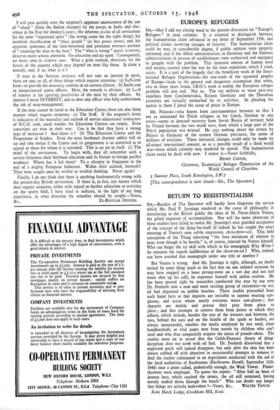SIR,—May I add my closing word to the present discussion
on "Europe's Refugees " in your columns. It is essential to distinguish between the humanitarian claim advanced in my letter of September 17th, and political claims involving changes of frontier. The humanitarian claim could be met, in considerable degree, if public opinion were properly informed, and if the Allied administrations in Germany and the German administrations in process of establishment were authorised and equipped to grapple with the problem. This immense morass of human need and misery, created since `the war by the mass expulsions which I cited, exists. It is a part of the tragedy that the beneficent work of the Inter- national Refugee Organisation—for one-tenth of the uprooted peoples of Europe—leads to the general and dangerous assumption that when, two or three years hence, I.R.O.'s work is ended, the European refugee problem will also end. Not so. The ten millions or more post-war expellees from Czechoslovakia, Eastern Germany and the Danubian countries are virtually untouched by its activities. In pleading for justice to them I plead the cause of peace in Europe.
Mr. Polanski—who knows from correspondence between us that I am as concerned for Polish refugees as for Czech, German or any ether—seems to demand recovery from Soviet Russia of territory held by Poland between the two world wars, from which a large part of the Polish population was evicted. He says nothing about the return by Poland to Germany of the eastern German provinces, the scene of millions of evictions. These territorial changes could only be made by all-round international consent, or as a possible result of a third world war—from which calamity may mankind be spared. The humanitarian claim could be dealt with now. I renew it.—Yours faithfully,
HENRY CARTER,
Chairman, Ecumenical Refugee 6ommission of the World Council of Churches.
5 Sumner Place, South Kensington, S.W.7


































 Previous page
Previous page